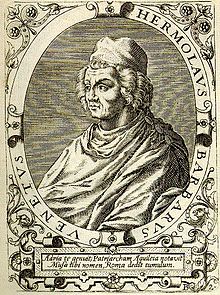Ermolao Barbaro: Difference between revisions
Units/dates/other |
blue links, organization, and additional info found within the source provided of Britannica |
||
| Line 1: | Line 1: | ||
[[Image:Hermolaus Barbarus.jpg|thumb|right|Ermolao Barbaro]] |
[[Image:Hermolaus Barbarus.jpg|thumb|right|Ermolao Barbaro]] |
||
'''Ermolao''' or '''Hermolao Barbaro''', also '''Hermolaus Barbarus''' ([[21 May]] [[1454]]—[[14 June]] [[1493]]/1495), was an [[Italy|Italian]] [[Renaissance]] [[scholar]]. |
'''Ermolao''' or '''Hermolao Barbaro''', also '''Hermolaus Barbarus''' ([[21 May]] [[1454]]—[[14 June]] [[1493]]/1495), was an [[Italy|Italian]] [[Renaissance]] [[scholar]] of the noble [[Barbaro family]]. |
||
Barbaro was born in [[Venice]], the son of Zaccaria Barbaro, and the grandson of [[Francesco Barbaro]]. At an early age he was sent to [[Rome]], where he studied under [[Pomponius Laetus]]. He completed his education at the [[ |
Barbaro was born in [[Venice]], the son of Zaccaria Barbaro, and the grandson of [[Francesco Barbaro]]. At an early age he was sent to [[Rome]], where he studied under [[Pomponius Laetus]]. He completed his education at the [[University of Padua]], where he was appointed professor of [[philosophy]] in 1477. Two years later he revisited Venice, but returned to [[Padua]] when the [[Black Death|plague]] broke out in his native city. |
||
He was sent on various missions to persons of high rank, amongst them [[Pope Innocent VIII]], by whom he was nominated to the important office of [[patriarch of Aquileia]] (1491). |
He was sent on various missions to persons of high rank, amongst them [[Pope Innocent VIII]], by whom he was nominated to the important office of [[patriarch of Aquileia]] (1491). While residing in Rome, Barbaro wrote ''De Officio Legati'', a treatise on the functions of an ambassador. However, Barbaro's most important work was the ''Castigationes Plinianae'' (The Castigations of Pliny) which noted many inaccuracies in the scientific work of the ancient Roman, [[Pliny the Elder]], thereby fueling an important movement in Renaissance scientific enlightenment. Ermolao remained at [[Rome]], in receipt of a small pension from the pontifical government, until his death in 1493 (according to some, two years later). |
||
Barbaro is remembered for his scholarly work on [[Aristotle]] among other writers. |
Barbaro is remembered for his scholarly work on [[Aristotle]] among other writers. |
||
Revision as of 08:06, 15 December 2008

Ermolao or Hermolao Barbaro, also Hermolaus Barbarus (21 May 1454—14 June 1493/1495), was an Italian Renaissance scholar of the noble Barbaro family.
Barbaro was born in Venice, the son of Zaccaria Barbaro, and the grandson of Francesco Barbaro. At an early age he was sent to Rome, where he studied under Pomponius Laetus. He completed his education at the University of Padua, where he was appointed professor of philosophy in 1477. Two years later he revisited Venice, but returned to Padua when the plague broke out in his native city.
He was sent on various missions to persons of high rank, amongst them Pope Innocent VIII, by whom he was nominated to the important office of patriarch of Aquileia (1491). While residing in Rome, Barbaro wrote De Officio Legati, a treatise on the functions of an ambassador. However, Barbaro's most important work was the Castigationes Plinianae (The Castigations of Pliny) which noted many inaccuracies in the scientific work of the ancient Roman, Pliny the Elder, thereby fueling an important movement in Renaissance scientific enlightenment. Ermolao remained at Rome, in receipt of a small pension from the pontifical government, until his death in 1493 (according to some, two years later).
Barbaro is remembered for his scholarly work on Aristotle among other writers.
References
- This article incorporates text from a publication now in the public domain: Chisholm, Hugh, ed. (1911). Encyclopædia Britannica (11th ed.). Cambridge University Press.
{{cite encyclopedia}}: Missing or empty|title=(help)
